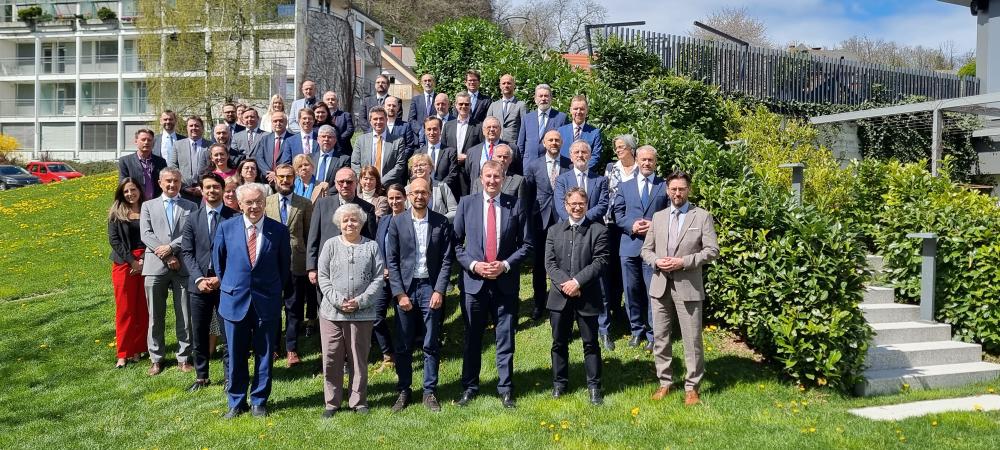
The Western European Nuclear Regulators’ Association (WENRA) came together for its Spring Plenary meeting on 8th and 9th April, hosted by the Slovenian Nuclear Safety Administration (SNSA), in Bled, Slovenia. WENRA members work as a collective group of national nuclear regulators in support of its mission to continuously improve and harmonise nuclear safety to as high as reasonably practicable levels.
On behalf of the Slovenian Government, mag. Miran Gajšek, State Secretary, Minister of Natural Resources and Spatial Planning provided the opening address, formally welcoming WENRA members to Slovenia and reinforcing the importance of WENRA in ensuring consistent high levels of nuclear safety in Europe, protecting people and the environment now and in the future.
A number of important topics were discussed, including how WENRA could broaden its influence by developing closer relationships with other counties, by becoming part of a wider WENRA family. Strengthening relationships was a consistent theme during the Plenary meeting leading to a commitment to collaborate with the European Nuclear Security Regulators Association (ENSRA) in establishing an effective cyber security posture within the civil nuclear sector, and opportunities to work with other international bodies on key topics aligned to the WENRA Strategy.
The Plenary received a comprehensive update on the situation in Ukraine and significant challenges faced by the State Nuclear Regulatory Inspectorate of Ukraine (SNRIU). This included a report on the assessment and damage to the integrity of the outer shell of the New Safe Confinement shelter at Chernobyl NNP Unit 4, and measures to restore safe management of the containment. There was a commitment to share international experience on approaches to the regulation of the resumption of construction work of NPP after a prolonged period of dormancy, which would help inform Ukraine’s goal of completing the construction Khmelnitsky NPP Units 3 and 4 and the associated challenges that will need to be overcome.
WENRA’s working groups provided comprehensive updates showing good progress with a continued focus on harmonisation of Safety Reference Levels. This included a report from the Recruitment and Skills Working Group, whose purpose is to share learning, knowledge and experience to support WENRA members in addressing common skills and capability challenges.
Aligned to WENRA’s strategic objective to establish and adopt good practices to regulatory cooperation for the review and assessment of new technologies, the Plenary agreed to the development of an approach to generic assessment of concept designs for new reactor technologies that could be adopted by the wider regulatory community. The goal is to have more consistent regulatory reviews of reactor concepts across countries, enabling better leveraging of design assessments conducted by regulators, more standardised reactors designs being constructed and operated, and ultimately strengthening nuclear safety. Given the importance of this issue and associated timescales, a working group has been established and the approach will be considered by the WENRA Plenary at its next meeting in November.
Work continues on the important question ‘How Safe is Safe Enough,’ focusing on ensuring equal protection of the public, especially in the context of Small Modular Reactors and their potential siting closer to population centres. The Plenary acknowledged that this is a complex issue and work will proceed over the summer, involving colleagues from WENRA’s Reactor Harmonisation Working Group (RHWG), alongside engagement with the industry group ENISS to ensure WENRAs review of the topic is properly informed. Again, this important issue will be considered further by the WENRA Plenary in November.
There was also discussion on the political situation in Europe and beyond, highlighting the growing support for nuclear as part of the energy mix, with an increased focus on the need for efficient and effective legal and regulatory processes, while continuing to uphold the highest standards of nuclear safety.
Overall, a productive two days that saw WENRA members working collaboratively on several important issues relevant to the continued nuclear and radiation safety of an increasingly dynamic industry.